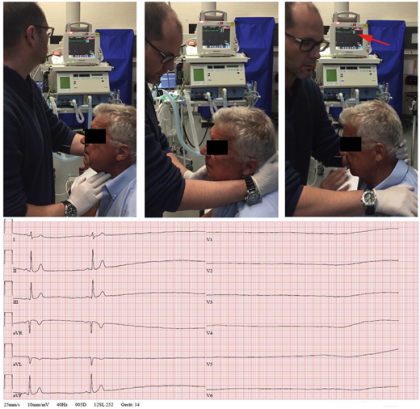- Home
- Editorial
- News
- Practice Guidelines
- Anesthesiology Guidelines
- Cancer Guidelines
- Cardiac Sciences Guidelines
- Critical Care Guidelines
- Dentistry Guidelines
- Dermatology Guidelines
- Diabetes and Endo Guidelines
- Diagnostics Guidelines
- ENT Guidelines
- Featured Practice Guidelines
- Gastroenterology Guidelines
- Geriatrics Guidelines
- Medicine Guidelines
- Nephrology Guidelines
- Neurosciences Guidelines
- Obs and Gynae Guidelines
- Ophthalmology Guidelines
- Orthopaedics Guidelines
- Paediatrics Guidelines
- Psychiatry Guidelines
- Pulmonology Guidelines
- Radiology Guidelines
- Surgery Guidelines
- Urology Guidelines
Cardiac arrest while diving due to Carotid sinus syndrome

An unusual case of Carotid sinus syndrome presenting as cardiac arrest while diving has appeared in European Heart Journal - Case Reports. The case has been reported by Dr Frank Hartig at Department of Internal Medicine, University Hospital Innsbruck, Austria, and colleagues.
Carotid sinus syndrome (CSS) is an exaggerated response to carotid sinus baroreceptor stimulation, which may result in hypotension, prolonged asystole, and subsequently transient loss of consciousness due to cerebral hypoperfusion. However, this commonly benign syndrome may have lethal consequences under certain circumstances such as scuba diving
 ECG rhythm strip during carotid sinus massage leading to asystole and syncope
ECG rhythm strip during carotid sinus massage leading to asystole and syncopeThe authors report the case of a trained 73-year-old male diver, who survived an almost fatal diving accident without any neurological deficits due to cardiac arrest under water. After recovery and intensive diagnostics in the local hospital, the origin of cardiac arrest remained unclear. However, after referral to our tertiary care center, CSS could be diagnosed by provoking syncope and asystole with carotid sinus massage (CSM). Consequently, a leadless pacing system was implanted and his medical diving fitness could then be recertified.
Learning points
• Carotid sinus syndrome (CSS) may be an underdiagnosed cause of loss of consciousness with potential lethal consequences.
• Carotid sinus massage should be included in medical examinations in elderly divers and athletes.
• Asystole and syncope in cardio-inhibitory CSS can be prevented by cardiac pacing and a leadless intracardiac pacemaker is effective in CSS patients during scuba diving
For further reference, log on to :
https://doi.org/10.1093/ehjcr/yty128

Disclaimer: This site is primarily intended for healthcare professionals. Any content/information on this website does not replace the advice of medical and/or health professionals and should not be construed as medical/diagnostic advice/endorsement or prescription. Use of this site is subject to our terms of use, privacy policy, advertisement policy. © 2020 Minerva Medical Treatment Pvt Ltd